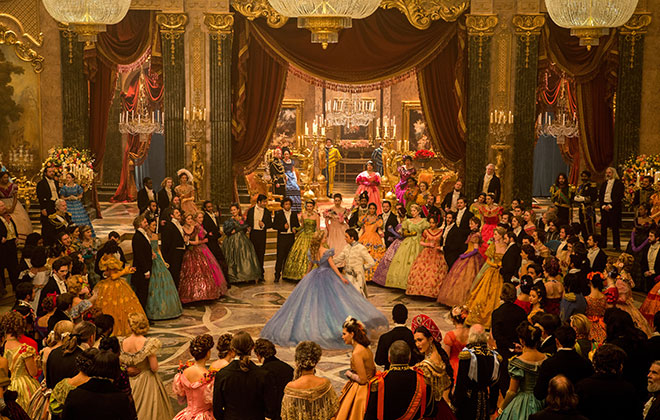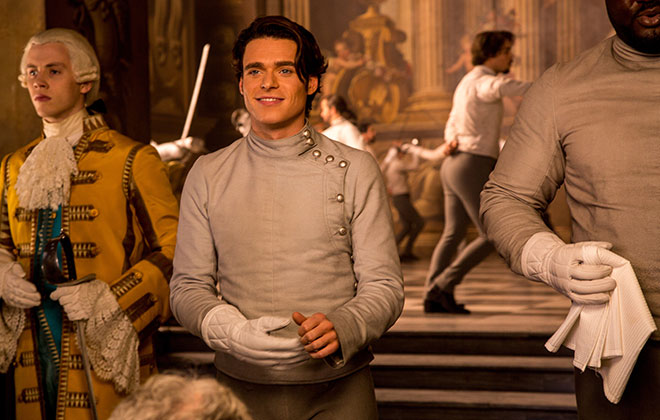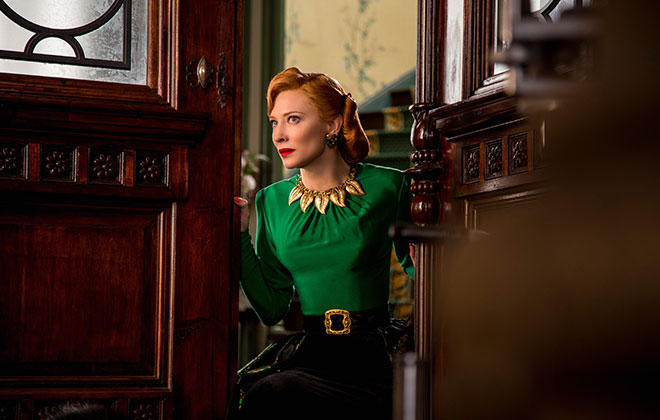Enchanting ‘Cinderella’ plays it straight and wins

Lily James is Cinderella, Sophie McShera is Drisella and Holliday Grainger is Anastasia in Disney's live-action feature inspired by the classic fairy tale, CINDERELLA, which brings to life the timeless images from Disney's 1950 animated masterpiece as fully-realized characters in a visually dazzling spectacle for a whole new generation.

Lily James is Cinderella and Richard Madden is the Prince in Disney's live-action feature inspired by the classic fairy tale, CINDERELLA, which brings to life the timeless images from Disney's 1950 animated masterpiece as fully-realized characters in a visually dazzling spectacle for a whole new generation.


Cate Blanchett is the Stepmother in Disney's live-action feature CINDERELLA, directed by Kennth Branagh.




In this age of revisionist, modernized Disney fairy tales, where we’ve learned that some of our favorite characters really aren’t what they seemed, the striking thing about the studio’s sumptuous new live-action "Cinderella" may not be what it is, but what it isn’t.
| ‘CINDERELLA’ Rated: PG    Opens Friday |
It isn’t revisionist. It isn’t modernized. The good guys are still good, the bad still bad. Prince Charming? Still very charming, not a "Frozen"-style cad. And the evil stepmother? She’s not, like Angelina Jolie’s Maleficent, merely misunderstood; as embodied by Cate Blanchett, she remains evil to the core. (Though it must be said: Evil has never looked quite so fabulous.)
What "Cinderella" is, though, is touching, visually stunning, and very satisfying. Director Kenneth Branagh, working with a high-wattage cast led by the winsome and genuine Lily James, sticks to tried-and-true narrative formula, and infuses it with wit and style. If the glass slipper isn’t broken, he seems to be saying, why fix it?
A prologue shows us Cinderella’s childhood, as a little girl named Ella — a lovely thing who’s kind to all, and has a way of communing with animals. She lives in a rambling country home with her loving parents (Hayley Atwell, Ben Chaplin), and all is perfect until, of course, Ella’s mother takes ill and dies.
It won’t be long before Dad, so sweet but so inexplicably clueless, will take up with the widowed Lady Tremaine, who arrives with her two dimwitted daughters and starts rearranging things. We all know how bad things will get, but when Blanchett shows up with her raven hair, her chic ’40s-style glamour and the first of many jaw-dropping dresses (via masterful costume designer Sandy Powell), well, it’s hard not to secretly root for a villain with such stunning fashion sense.
But we digress. The story’s about Cinderella, as her mean stepsisters rename Ella when they see her sweet face dirtied by cinders. Already relegated to the attic, her life changes for good when her father dies, rendering her not only an orphan but also a servant.
Don't miss out on what's happening!
Stay in touch with breaking news, as it happens, conveniently in your email inbox. It's FREE!
Out in the forest one day, Cinderella encounters a steed being chased by hunters. She admonishes the lead hunter — a young man called Kit — to be kind and spare the animal. Her logic and pluck charm Kit, who of course is Prince Charming (a ridiculously attractive, azure-eyed Richard Madden).
This chance meeting is perhaps the most obvious detour that screenwriter Chris Weitz takes from the traditional tale.
Back at the palace, we see Kit struggling against his duty to marry for wealth and advantage. Desperate to see that country girl again, he opens the upcoming ball to all women in the kingdom. But Lady Tremaine, more sinister by the moment, forbids Cinderella to attend; she even rips the dress that the girl has lovingly resuscitated from her mother’s closet.
Natch, this is where Fairy Godmother turns up, in the campy, fun-loving personage of Helena Bonham Carter. She’s a bit rusty with the magic but transforms a pink frock into an ice-blue confection fit for a princess, and a pumpkin into the most gorgeous gilded carriage you’ve ever seen. The goose becomes the chauffeur — "I can’t drive, I’m a goose!" he protests — and the crowning touch is, of course, the glass slippers. ("You’ll find they’re really comfortable," Godmother notes, hilariously.)
The palace ball is as sumptuous as any little girl could want (kudos to production designer Dante Ferretti), and Branagh makes the ending, that magical moment where the slipper fits, as suspenseful as it can be when we’ve all known the story our whole lives.
There is a message here, and it may disappoint anyone looking for a new feminist heroine to emerge from the cinders. It’s about kindness and forgiveness, and sticking to your life ethos no matter what confronts you.
Hardly revolutionary. But somehow, like that glass slipper, it fits just right.



